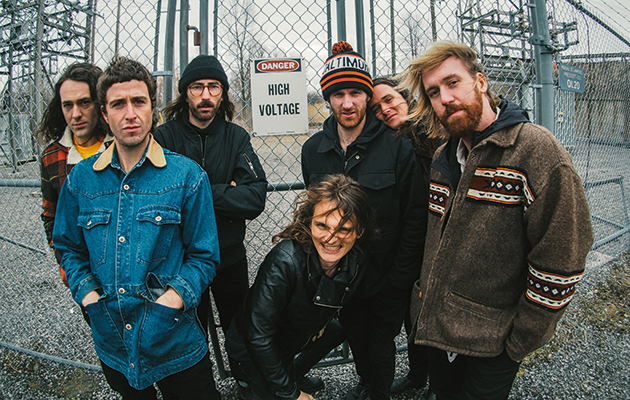King Gizzard & The Lizard Wizard are such an unlikely proposition on so many counts, it seems oddly plausible for them to be conquering America, too. Audience sizes swell with every visit and new releases score high on Billboard’s vinyl and independent charts. “It’s really exciting what’s happening with the band,” says Jon Salter, who signed them to their American label ATO after his own conversion experience at Bonnaroo in 2015. “They have this army that’s mobilising and spreading – one kid leaves the show freaking out then he tells 10 of his friends and they come back every time.”
“Not only are they so good, but they just make so much stuff,” says Courtney Barnett, a friend of the band since their paths intersected in Melbourne seven years ago. “They’re a great example of getting on with it, just doing it and not caring about what people say – that’s really inspiring.”
Says Mackenzie, “We definitely did have advice from people who’d tell us, ‘If you’re gonna tour, would you consider downsizing the group – it’ll be a lot cheaper.’ Or ‘why don’t you just cut some material out and just make one record instead of three?’ But we’ve just being driven by whatever we thought was the most fun thing to do.”
Nevertheless, strangeness abounds here at the centre of the Gizzard universe, a realm that’s rapidly expanding both in terms of its audiovisual splendours and its population of acolytes. At times, Mackenzie can’t help but feel perplexed. “Four out of the 10 people I talked to after the show last night in Chicago were Phish fans,” he says. “I don’t know what that means.”
Only an hour’s drive away from the Bonnaroo site, Nashville’s become a major Gizzard hotspot. Last year, the band sold out the Mercy Lounge, the smaller of the two clubs in a renovated red-brick flour mill just south of Nashville’s gleaming downtown. (Third Man Records is on the next block.) The fact that the band sold out the larger Cannery Ballroom indicates Nashville’s ongoing shift toward wilder sounds than the kind that made it famous. As a club staffer tells Uncut in a Tennessee twang, “Psychedelic bands always sell out here… and metal bands. The country ones don’t.”
Having arrived after an overnight drive from Chicago – it’s the first time they’ve rented a sleeper bus – the bandmates have time to idle along the 8th Avenue strip of restaurants, bars and shops near the venue. At a stop in the Nashville Boot Co, drummer and manager Eric Moore reels at the pungent aroma of rawhide while fellow drummer Michael “Cavs” Cavanaugh ponders the purchase of a new Stetson hat. Further down the block in Carter Vintage Guitars, Mackenzie is excited to spot a six-string version of the Hagstrom 12 that’s one of the two guitars he uses on this tour. (The second is the custom-made yellow guitar whose nickname inspired the title of Flying Microtonal Banana, the first of this year’s Gizzard albums.) A group discussion ensures over whether a coveted pedal should be bought for Gizzard or The Murlocs – the garage-R&B act that’s another creative outlet for keyboard and harmonica player Ambrose Kenny-Smith and guitarist Cook Craig. It is brought to an abrupt end when a silver-haired senior in a green golf shirt picks up a guitar and plays the intro of “There She Goes” note-perfect .
The quest for vegan fare leads the mob to a roomy café bar. Over grilled cheese sandwiches and salads, they reminisce about the various teenage combos and cover bands they formed with each other growing up in Geelong and Torquay, two towns near Melbourne. After they all met up in university in Melbourne (guitarist Joey Walker is the only big-city lad), more blues, garage and psych groups followed. It was out of the ensuing gigs, parties and shared houses that King Gizzard took shape.
“We wanted to put together a band where no-one had to practise, essentially,” says Mackenzie. “The early music was so primal. Our first songs had a maximum five words, three chords, preferably one – then play it as loud as you can.”



